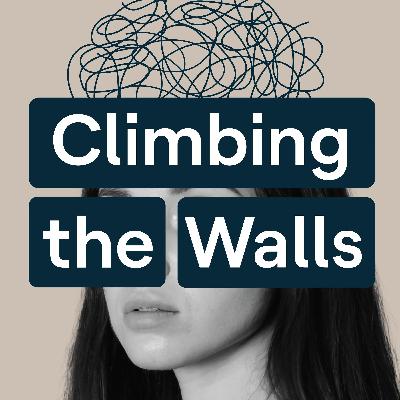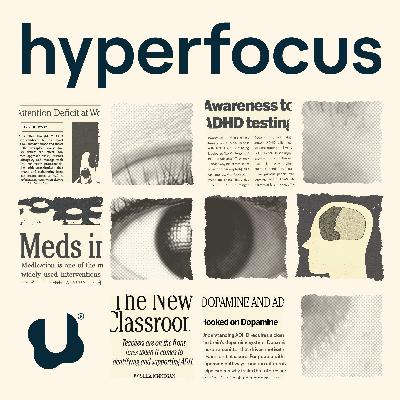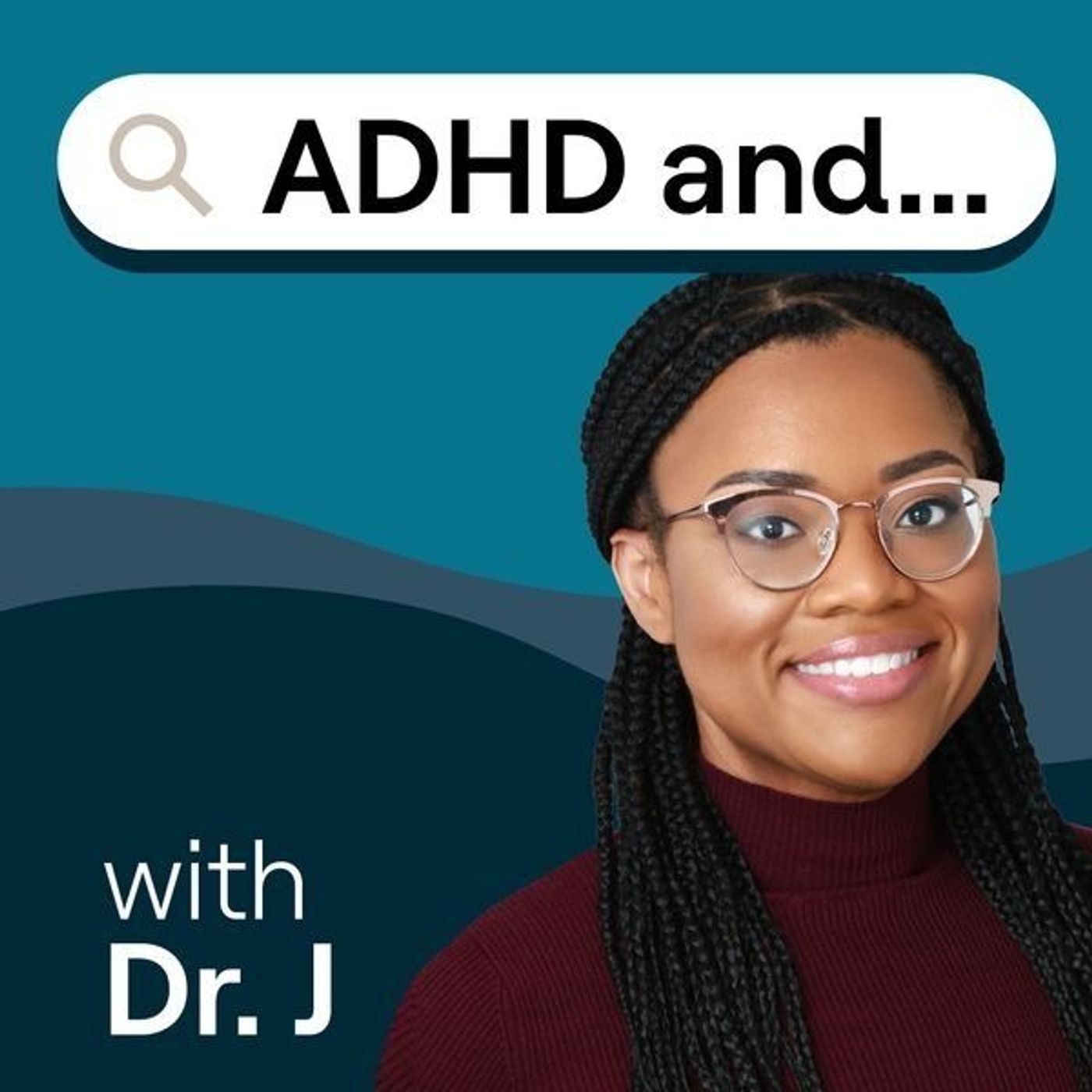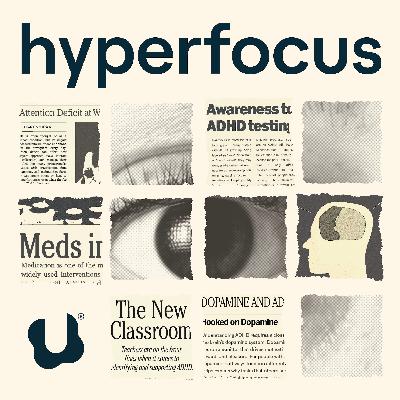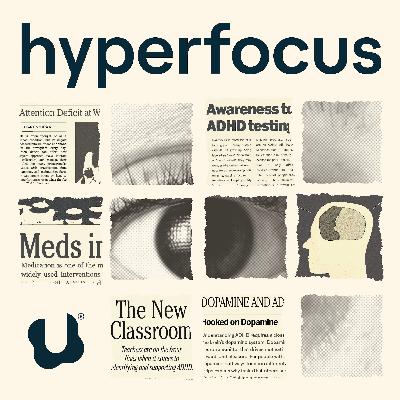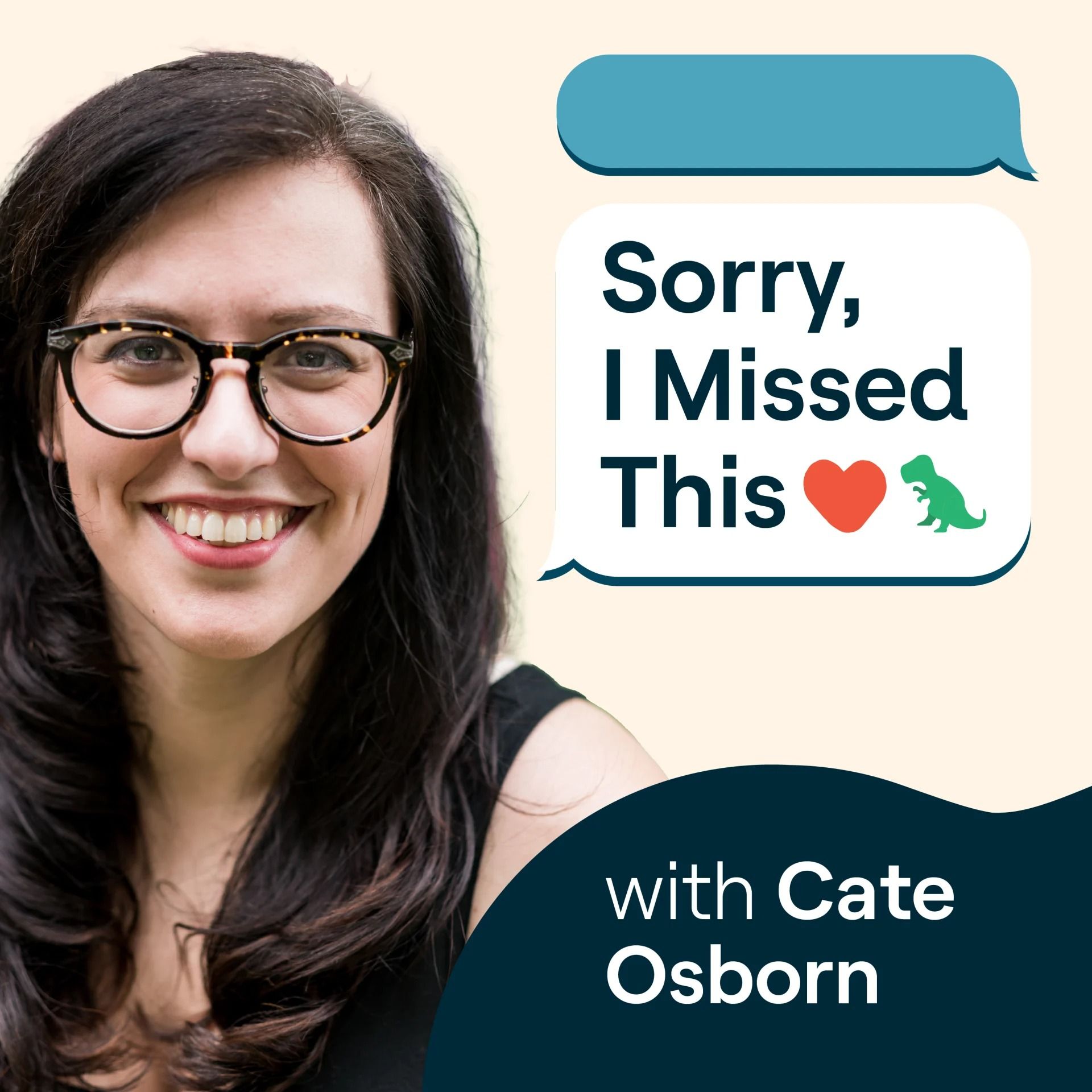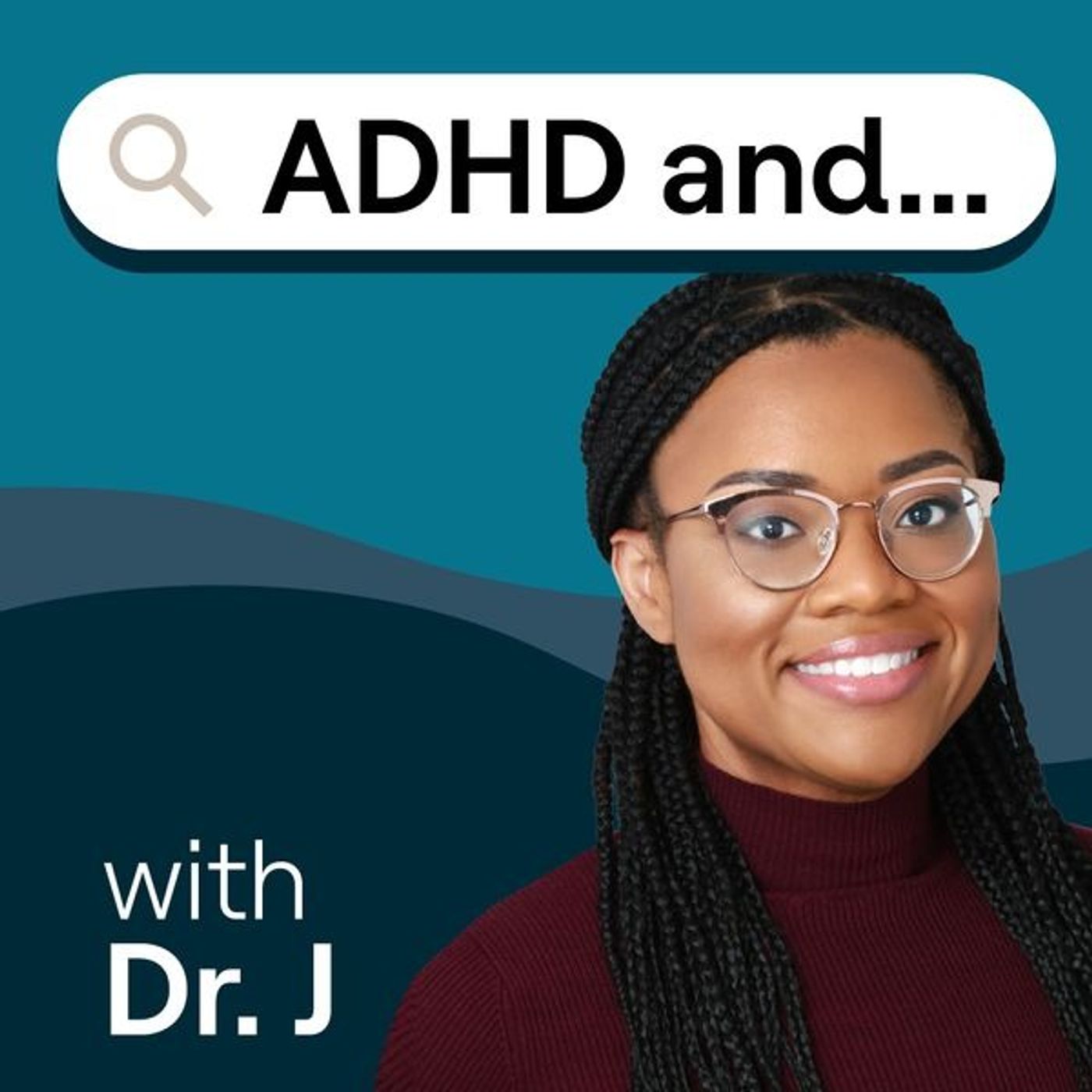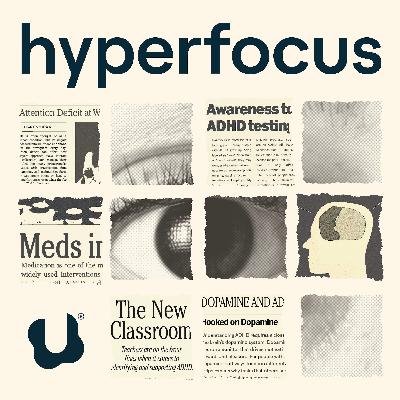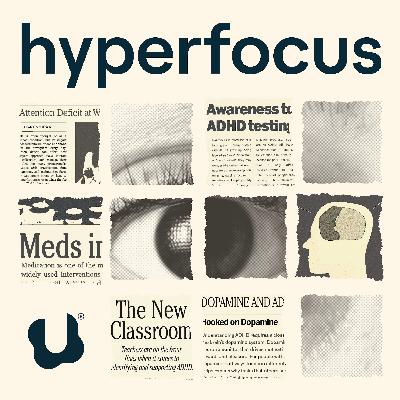Discover MissUnderstood: The ADHD in Women Channel
MissUnderstood: The ADHD in Women Channel

MissUnderstood: The ADHD in Women Channel
Author: Understood.org
Subscribed: 242Played: 3,599Subscribe
Share
Description
From Understood.org, this is MissUnderstood: The ADHD in Women Channel. It’s the first-ever podcast channel for women with ADHD.
For decades, women with ADHD have been overlooked and undiagnosed. That’s finally beginning to change. But there’s still so far to go.
This is where MissUnderstood comes in. We’re a channel made by women with ADHD for women with ADHD. And we’re talking about the things we want to hear. Women with ADHD need (good!) information, smart takes on ADHD topics, and so much more.
Hang out with @catieosaurus and guests as they discuss ADHD, relationships, and sex on Sorry, I Missed This. Get answers to the ADHD questions you didn’t know you had from Dr. Monica Johnson on ADHD and…. Or tune in for practical tips from empathetic ADHD coach (who’s totally been there) Jaye Lin with Tips From an ADHD Coach.
For decades, women with ADHD have been overlooked and undiagnosed. That’s finally beginning to change. But there’s still so far to go.
This is where MissUnderstood comes in. We’re a channel made by women with ADHD for women with ADHD. And we’re talking about the things we want to hear. Women with ADHD need (good!) information, smart takes on ADHD topics, and so much more.
Hang out with @catieosaurus and guests as they discuss ADHD, relationships, and sex on Sorry, I Missed This. Get answers to the ADHD questions you didn’t know you had from Dr. Monica Johnson on ADHD and…. Or tune in for practical tips from empathetic ADHD coach (who’s totally been there) Jaye Lin with Tips From an ADHD Coach.
135 Episodes
Reverse
On episode 3 of Climbing the Walls, we see that as ADHD content explodes during the pandemic, many people seek care for the first time. That includes many Black women. But new telehealth rules also open the door for potential misdiagnosis. More on this story:ADHD symptoms in womenHow to handle a misdiagnosisA day in Danielle’s lifeFor a transcript and more resources, visit Climbing the Walls on Understood.org. You can also email us at podcast@understood.org.
Understood.org is a nonprofit organization dedicated to empowering people with learning and thinking differences, like ADHD and dyslexia. If you want to help us continue this work, donate at understood.org/give Hosted by Simplecast, an AdsWizz company. See pcm.adswizz.com for information about our collection and use of personal data for advertising.
In the next episode of Climbing the Walls, we meet Sari Solden — who was looking for answers. Why was she having memory issues? Why couldn’t she get her life organized? Where did this feeling of deep shame come from?Sari’s books have changed the lives of generations of women with ADHD. Her early research uncovered the truth that the disorder looks different in women.More on this story:ADHD symptoms in womenHow ADHD can affect your mental healthA history of ADHD medicationADHD and shameMeet the pioneers of research on ADHD in womenFor a transcript and more resources, visit Climbing the Walls on Understood.org. You can also email us at podcast@understood.org.
Understood.org is a nonprofit organization dedicated to empowering people with learning and thinking differences, like ADHD and dyslexia. If you want to help us continue this work, donate at understood.org/give Hosted by Simplecast, an AdsWizz company. See pcm.adswizz.com for information about our collection and use of personal data for advertising.
This month, we’re featuring our limited series Climbing the Walls. Join health and science journalist Danielle Elliot as she explores the surge in ADHD diagnoses among women. She shares her own story and speaks with experts and women across the country to uncover why it’s happening — and why now.In this first episode, when Danielle finds herself among the many women diagnosed with ADHD during the pandemic, she gets curious. Why women? Why now? This question takes her to northern Michigan, to meet a friend’s mom.More on this story: ADHD and rejection sensitive dysphoria (RSD)Older women and ADHD: How the lost generation got foundThree days with ADHDFor a transcript and more resources, visit Climbing the Walls on Understood.org. You can also email us at podcast@understood.org.
Understood.org is a nonprofit organization dedicated to empowering people with learning and thinking differences, like ADHD and dyslexia. If you want to help us continue this work, donate at understood.org/give Hosted by Simplecast, an AdsWizz company. See pcm.adswizz.com for information about our collection and use of personal data for advertising.
One of the most urgent ADHD research gaps has to do with ADHD and trans people. We know there are lots of trans folks with ADHD. But when it comes to understanding how best to treat them, it’s a whole different story. That’s why we wanted to talk to someone who knows this experience well. Ivan Hsiao is the founder of Trans Health HQ. He joined this week’s Hyperfocus to share his own diagnosis story and to talk about what we do (and don’t) know about being trans with ADHD. For more on this topic: Trans Health HQBeing trans with ADHD (Max’s story)Talking about neurodivergence and gender identityTimestamps: (01:26) Ivan’s diagnosis story(11:18) Trans broken arm syndrome(13:56) What research is there on ADHD in trans people? (17:23) How to practice better careFor a transcript and more resources, visit Hyperfocus on Understood.org. You can also email us at hyperfocus@understood.org.
Understood.org is a nonprofit organization dedicated to empowering people with learning and thinking differences, like ADHD and dyslexia. If you want to help us continue this work, donate at understood.org/give Hosted by Simplecast, an AdsWizz company. See pcm.adswizz.com for information about our collection and use of personal data for advertising.
Ever said yes to sex a little too fast and regretted it later? Same. Today we’re joined by psychologist and Understood Expert Dr. Ari Tuckman for a candid talk about impulsivity, ADHD, and intimacy. We’ll dig into the messy mix of consent, shame, and emotional regulation. And we’ll talk about how to slow down, stay curious, and find self-compassion after a spicy decision. For more on this topic: Listen: Impulsivity, risky behavior, and obsessions (Chris’ story)Listen: ADHD, loving intensely, and impulsivity (Ange’s story)Timestamps:02:15 How ADHD-related impulsivity can influence sexual decisions08:45 Consent, emotional regulation, and navigating pressure or fear of rejection17:30 Differentiating shame from embarrassment after vulnerable sexual experiences28:10 Strategies for slowing down and gathering insights from experiencesFor a transcript and more resources, visit Sorry, I Missed This on Understood.org. You can also email us at sorryimissedthis@understood.org.
Understood.org is a nonprofit organization dedicated to empowering people with learning and thinking differences, like ADHD and dyslexia. If you want to help us continue this work, donate at understood.org/give Hosted by Simplecast, an AdsWizz company. See pcm.adswizz.com for information about our collection and use of personal data for advertising.
Breakups are hard for everyone. But for women with ADHD, they can feel all-consuming. Dr. J unpacks why heartbreak hits harder when you have ADHD — and how your brain’s reward system, emotional regulation, and executive functions all get thrown off balance. You’ll learn science-backed strategies to stop the mental replay loop, manage impulsivity, and start healing with compassion. If you’ve ever felt “too much” after a breakup, this episode is for you.For more on this topic: Listen: Dr. J’s breakup playlistListen: ADHD and emotional regulationListen: ADHD and dating: Why crushes feel so intenseListen: ADHD and dating: Why casual dating never feels casualTimestamps: (00:47) Why heartbreak feels like withdrawal for ADHD brains(01:26) How emotional intensity and slower recovery amplify grief(02:54) The science behind stress, distraction, and impulsivity(06:24) Practical tools to interrupt mental replay and reclaim focus(09:48) Using your ADHD traits to support recovery and renewalFor a transcript and more resources, visit MissUnderstood on Understood.org. You can also email us at podcast@understood.org.
Understood.org is a nonprofit organization dedicated to empowering people with learning and thinking differences, like ADHD and dyslexia. If you want to help us continue this work, donate at understood.org/give Hosted by Simplecast, an AdsWizz company. See pcm.adswizz.com for information about our collection and use of personal data for advertising.
Last month, the Trump administration laid off over 460 people in the U.S. Department of Education. It included nearly everyone in the Office of Special Education Programs (OSEP), which enforces federal special education laws. A federal judge has temporarily halted the layoffs, but it’s unclear what will happen next. For people who work in or rely on special education services — including 7.5 million kids — the chaos and worry have already begun.So on this week’s Hyperfocus, we wanted to talk to smart people who could give us some perspective on what’s happening. What could it mean for families and for schools? And what does it say about how the administration views neurodivergent people in general?Our guests are Meghan Whittaker, a former chief of staff at the U.S. Department of Education, and Julian Saavedra, an assistant principal. For more on this topic: What the special education layoffs mean for your child’s IEP and school servicesWhat happens to my child’s IEP if the U.S. Department of Education closes?The R-word is back: How do you get people to care? Special education: Federal law vs. state lawTimestamps:(03:04) A breakdown of the layoffs(10:16) How worry is already hitting families and schools(18:02) What to know about school vouchers(29:50) “Find your space to serve”For a transcript and more resources, visit Hyperfocus on Understood.org. You can also email us at hyperfocus@understood.org.
Understood.org is a nonprofit organization dedicated to empowering people with learning and thinking differences, like ADHD and dyslexia. If you want to help us continue this work, donate at understood.org/give Hosted by Simplecast, an AdsWizz company. See pcm.adswizz.com for information about our collection and use of personal data for advertising.
The holidays are here — and so is all the food, family, and sensory overload that can come with them. Host Cate Osborn sits down with Aleta Storch, dietitian, nutritionist, ADHD expert, and founder of Wise Heart Nutrition, to talk about food and ADHD. They cover what disordered eating looks like (and how it’s different from a diagnosed eating disorder), why sensory sensitivities can make meals stressful, and what it’s like not to be believed when you say you don’t want to eat something. Plus, the dopamine rush of holiday treats — and how to navigate it all with more compassion and understanding.(Note: This episode does not dive deeply into diagnosed eating disorders — we’ll have another episode in the future focused entirely on that topic.)For more on this topic: The National Eating Disorders AssociationADHD and eatingUnderstood.org’s “Neurodiversity and the Holidays” surveyAleta’s website, www.wiseheartnutrition.comAleta’s Instagram, @the_adhd_rdTimestamps:(00:00) Intro(02:05) Aleta’s personal story with ADHD and eating(05:48) What’s the difference between an eating disorder and disordered eating? (07:46) What about ADHD can affect our relationship with food? (13:39) Sensory challenges and food(18:11) The consequences of ignoring our own needs(20:12) Good food practices to support ourselves and the neurodivergent people in our lives(26:23) Aleta’s parting advice for the holidays(28:23) Outro and creditsFor a transcript and more resources, visit Sorry, I Missed This on Understood.org. You can also email us at sorryimissedthis@understood.org.
Understood.org is a nonprofit organization dedicated to empowering people with learning and thinking differences, like ADHD and dyslexia. If you want to help us continue this work, donate at understood.org/give Hosted by Simplecast, an AdsWizz company. See pcm.adswizz.com for information about our collection and use of personal data for advertising.
For many women with ADHD, the spark of a new relationship feels like magic. But what happens when commitment feels like too much to manage?In this episode, Dr. Monica Johnson explains the ADHD brain during the early stages of a new relationship. Learn how ADHD impacts attachment and commitment for some women. Get tips for how to manage coming down from the emotional high when the initial spark fades.For more on this topic: ADHD and dating: Why crushes feel so intenseADHD and dating: Why casual dating never feels casualTips from an ADHD Coach: Is it love or is it dopamine?Timestamps: (00:00) Intro(01:05) What is new relationship energy (NRE)?(01:54) The ADHD brain and early romance (04:28) The difference between a fading spark and incompatibility (07:41) Tips for managing a new relationshipFor a transcript and more resources, visit MissUnderstood on Understood.org. You can also email us at podcast@understood.org.
Understood.org is a nonprofit organization dedicated to empowering people with learning and thinking differences, like ADHD and dyslexia. If you want to help us continue this work, donate at understood.org/give Hosted by Simplecast, an AdsWizz company. See pcm.adswizz.com for information about our collection and use of personal data for advertising.
In the final episode of our “Breaking the Burnout Cycle” three-part series, host Cate Osborn and Dr. Shauna Pollard explore what comes after burnout. They discuss how burnout can affect your relationships, the importance of communicating your needs clearly, and how to reflect on past experiences to avoid repeating patterns. Cate and Dr. Shauna also shares practical tips for tuning in to yourself, setting boundaries, and creating a plan for moving forward with greater awareness, balance, and resilience.For more on this topic: ADHD burnoutADHD and boundaries: Why saying no feels hard (and how to start)Setting boundaries in relationships with ADHDDr. Shauna's list of Executive Functioning ResourcesTimestamps: (00:00) Intro (01:44) We have more emotions to regulate while in burnout(05:26) How can burnout impact relationships?(14:32) Setting boundaries(17:52) How can we show up for our partners when we’re burned out?(23:11) Feeling “too much” for needing to have our needs met (24:44) What do we do if we don’t have a support system?(28:01) Outro and creditsFor a transcript and more resources, visit Sorry, I Missed This on Understood.org. You can also email us at sorryimissedthis@understood.org.
Understood.org is a nonprofit organization dedicated to empowering people with learning and thinking differences, like ADHD and dyslexia. If you want to help us continue this work, donate at understood.org/give Hosted by Simplecast, an AdsWizz company. See pcm.adswizz.com for information about our collection and use of personal data for advertising.
Why do some women with ADHD rush through the courting stage? Dr. Monica Johnson explains what happens in the ADHD brain during courting.From intense texting to early intimacy, the courting stage can look very different for women with ADHD. In this episode, find out what happens in the ADHD brain during courting. Learn how to recognize the difference between real chemistry and manipulation. And get tips on how to manage. For more on this topic: ADHD and dating: Why crushes feel so intenseTips from an ADHD Coach: Is it love or is it dopamine?Sorry, I Missed This: Online dating with ADHDTimestamps:(00:00) Intro(01:07) What is courting?(01:40) The ADHD brain and courting (02:58) How emotional dysregulation impacts relationships(04:42) Why courting can be challenging with ADHD(08:37) How to tell chemistry from manipulation (12:46) Tips for managing the courting stageFor a transcript and more resources, visit MissUnderstood on Understood.org. You can also email us at podcast@understood.org.
Understood.org is a nonprofit organization dedicated to empowering people with learning and thinking differences, like ADHD and dyslexia. If you want to help us continue this work, donate at understood.org/give Hosted by Simplecast, an AdsWizz company. See pcm.adswizz.com for information about our collection and use of personal data for advertising.
Inattentive ADHD often goes unnoticed. It’s an easier type of ADHD to miss because it’s more internal and less outwardly visible than its hyperactive, impulsive counterpart. But left unaddressed, inattentive ADHD can be just as disruptive.Boys with the inattentive type are especially overlooked — they don’t match the stereotype of what an “ADHD boy” is supposed to look like.So when Brandon Saiz wrote to us about his experience getting diagnosed with ADHD later in life, we knew we had to talk to him. After meeting with Brandon, it was clear his story needed to be shared.Content warning: This episode includes discussion of suicide. Please skip it if that’s not something you’re up for right now.For more on this topic:The 3 types of ADHDListen: The “devastating” findings of a decades-long ADHD studyBrandon Saiz on SubstackDuck, Duck! It's a Goose: Brandon's video gameTimestamps(01:54) Brandon’s background(09:23) How Brandon’s inattentive-type ADHD was overlooked(14:00) On suicidal ideation and inattentive ADHD (19:57) Brandon’s advice to othersFor a transcript and more resources, visit the Hyperfocus page on Understood.org. We love hearing from our listeners! Email us at hyperfocus@understood.org.
Understood.org is a nonprofit organization dedicated to empowering people with learning and thinking differences, like ADHD and dyslexia. If you want to help us continue this work, donate at understood.org/give Hosted by Simplecast, an AdsWizz company. See pcm.adswizz.com for information about our collection and use of personal data for advertising.
Burnout isn’t a weakness. It’s a signal that your body needs real rest. Dr. Shauna Pollard is back for the second episode in our “Breaking the Burnout Cycle” series to answer the question: What is rest? Cate and Dr. Pollard talk about what true, restorative rest looks like (hint: it’s not just zoning out on your phone), and how to start taking small, doable steps toward rest when you’re already deep in burnout.For more on this topic: ADHD burnoutFull Catastrophe Living, by Jon Kabat-ZinnYour Money or Your Life, by Joe Dominguez and Vicki RobinTimestamps: (00:00) Intro(02:08) How do you realize that enough is enough and you need to rest?(03:58) How do we know if the “rest” we’re taking is actually restorative? (09:10) Feeling guilty or uncomfortable with resting(15:18) How to decide what to pursue, and what to wait on(20:14) The relationship between perfectionism, procrastination, and burnout(23:41) Finding small moments to integrate rest, and other suggestions from Dr. Shauna(29:07) Outro and creditsFor a transcript and more resources, visit Sorry, I Missed This on Understood.org. You can also email us at sorryimissedthis@understood.org.
Understood.org is a nonprofit organization dedicated to empowering people with learning and thinking differences, like ADHD and dyslexia. If you want to help us continue this work, donate at understood.org/give Hosted by Simplecast, an AdsWizz company. See pcm.adswizz.com for information about our collection and use of personal data for advertising.
Have you ever met someone and suddenly you’re imagining your wedding playlist — all before the first date? Dr. Monica Johnson weighs in on the science behind crushes and the ADHD brain.In this episode, you’ll learn:What’s happening in your brain during a crushWhy women with ADHD often fall fast and hard in relationshipsHow to stay grounded in reality without completely shutting downFor more on this topic: ADHD and: Rejection sensitivitySorry, I Missed This: Dating with ADHDTips from an ADHD Coach: Is it love or is it dopamine?Timestamps:(00:00) Intro(00:57) Why do ADHD brains fall in love fast?(07:15) Strategies for remaining balanced while enjoying the butterflies(14:18) CreditsFor a transcript and more resources, visit MissUnderstood on Understood.org. You can also email us at podcast@understood.org.
Understood.org is a nonprofit organization dedicated to empowering people with learning and thinking differences, like ADHD and dyslexia. If you want to help us continue this work, donate at understood.org/give Hosted by Simplecast, an AdsWizz company. See pcm.adswizz.com for information about our collection and use of personal data for advertising.
Artificial intelligence has cemented itself as the latest world-altering technology. It follows the same lineage as electricity, the television, the internet — the list goes on. Depending on who you talk to, AI is the greatest thing ever or the thing that will destroy the world, with lots of room in the middle for discussion and experimentation. But within the bigger AI fascination, there’s a smaller yet critical conversation about how this technology might help or harm people who learn and think differently. That’s why we brought in Dr. Amy Gaeta for this week’s “Hyperfocus.” She’s an AI ethicist and researcher who also has autism, giving her a unique insight that she shares on our latest episode. For more on this topicAmy’s websiteWhat is assistive technology?6 ways AI can help you manage ADHD symptomsHow software and apps can help with math challengesUnderstood AssistantTimestamps(03:40) AI in the workplace(10:16) Disability justice and technology(13:45) AI’s built-in bias against disability (17:15) How to find helpful, safe AI uses(21:08) Chatbot therapy (25:14) What does the future hold for AI and neurodivergence? For a transcript and more resources, visit the Hyperfocus page on Understood.org. We love hearing from our listeners! Email us at hyperfocus@understood.org.
Understood.org is a nonprofit organization dedicated to empowering people with learning and thinking differences, like ADHD and dyslexia. If you want to help us continue this work, donate at understood.org/give Hosted by Simplecast, an AdsWizz company. See pcm.adswizz.com for information about our collection and use of personal data for advertising.
Feeling drained, unmotivated, or stuck in survival mode? In part one of our “Breaking the Burnout Cycle” series, host Cate Osborn and psychologist Dr. Shauna Pollard unpack the question: What is burnout? They explore the signs to watch for, how to recognize when you’re in it, and how it’s different from depression.If you’ve been wondering whether what you’re experiencing is burnout, this episode is a good place to start.Related resourcesADHD burnoutADHD and depressionDr. Shauna’s website, https://drspllc.com/Timestamps(00:00) A word from Cate on burnout(01:50) What is burnout? How is it different than depression?(05:57) What happens when ADHD perfectionism and overcommitting meets burnout?(08:06) How do we know that we’re starting to get burnout? How can we tell if it’s burnout or depression?(12:11) How to recognize whether your battery is low or completely tapped out(15:55) How to get to know ourselves and our bodies better to help us in the future(22:57) Burnout spreading from work into the home(26:39) Outro and creditsFor a transcript and more resources, visit the Sorry, I Missed This show page on Understood.org. We love hearing from our listeners! Email us at sorryimissedthis@understood.org.
Understood.org is a nonprofit organization dedicated to empowering people with learning and thinking differences, like ADHD and dyslexia. If you want to help us continue this work, donate at understood.org/give Hosted by Simplecast, an AdsWizz company. See pcm.adswizz.com for information about our collection and use of personal data for advertising.
Itchy tags, tight clothes, and scratchy fabrics can trigger real ADHD sensory overwhelm. Dr. Monica Johnson explains why it happens and what can help.For many women with ADHD, some clothing isn’t just uncomfortable — it can feel unbearable. This sensory overload can make even getting dressed a challenge. On this episode, you’ll learn:Why sensory overwhelm is more than being “too sensitive”How ADHD and sensory overload intersect, especially for womenThe common clothing triggers that spark discomfort (tags, textures, tight fits, etc.)Practical strategies to make daily routines easierFor more on this topicADHD and emotional dysregulationADHD and sensory overloadADHD, sensory systems, and communicationEvaluating dopamine reward pathway in ADHD: Clinical implicationsAbnormal functional connectivity in children with attention-deficit/hyperactivity disorderThe impact of deep pressure stimulation on anxietyThe effects of background white noise on memory performance in inattentive school childrenTimestamps(00:00) Intro(00:58) What is sensory processing(02:14) How to body responds to sensory overload(03:17) What sensory processing challenges can look like (07:04) Why sensory discomfort is different for women(08:32) Tips for managing sensory challengesFor a transcript and more resources, visit the MissUnderstood: ADHD in Women page on Understood.org. We love hearing from our listeners! Email us at podcasts@understood.org.
Understood.org is a nonprofit organization dedicated to empowering people with learning and thinking differences, like ADHD and dyslexia. If you want to help us continue this work, donate at understood.org/give Hosted by Simplecast, an AdsWizz company. See pcm.adswizz.com for information about our collection and use of personal data for advertising.
Craig Thomas is best known for his work on TV. He co-created the sitcom “How I Met Your Mother” and has written for “American Dad” and more. He’s penned songs for “Sesame Street” and essays for “The New Yorker.” He’s less known for being a dad. For now, at least. He has a daughter, Celia, and a son, Elliot, who was born with Jacobsen syndrome, a genetic condition causing physical and developmental disabilities. When Elliot was born, Craig’s career was taking off with “How I Met Your Mother.” “I was living an hour drama show at home and then driving to work and doing a sitcom,” Craig says. His upcoming novel, “That’s Not How It Happened,” is based in part on his family’s experience.If you heard our series on the resurgence of the R-word, you’ll recognize Craig’s voice. The conversation with him was so good that we’re sharing more!For more on this topicPreorder Craig’s novelCheck out Craig’s podcastHear Craig on our R-word episodes, part 1 and part 2Timestamps(02:20) Craig’s backstory and current work(09:45) How Craig relates to the disability community(13:10) Disability and media depictions (29:04) Comedy, the R-word, and why language matters(39:10) On parenting a child with disabilitiesFor a transcript and more resources, visit the Hyperfocus page on Understood.org. We love hearing from our listeners! Email us at hyperfocus@understood.org.
Understood.org is a nonprofit organization dedicated to empowering people with learning and thinking differences, like ADHD and dyslexia. If you want to help us continue this work, donate at understood.org/give Hosted by Simplecast, an AdsWizz company. See pcm.adswizz.com for information about our collection and use of personal data for advertising.
It’s a solo mailbag episode! Host Cate Osborn grabs her trusty D20 to let fate decide which listener emails to answer. Cate answers some common ADHD questions from navigating ADHD as a woman, to what it means to have a diagnosis, to how symptoms can shift as we age.Related resourcesUnderstood Explains podcast season 2: ADHD diagnosis in adultsADHD and: AgingFacebook group: ADHD Support for Women by Understood.orgTimestamps(00:00) Intro(00:27) The rules(01:14) Why do previously stimulating activities become routine?(02:48) What does an ADHD diagnosis provide?(05:30) What are some tips for self kindness when dealing with problems we’ve created?(09:56) How to not get too overloaded by a task(14:52) Does ADHD become more calm as you get older? Are there future treatments other than medication being developed?(21:38) A parting word from Cate(23:04) Outro and creditsFor a transcript and more resources, visit the Sorry, I Missed This show page on Understood.org. We love hearing from our listeners! Email us at sorryimissedthis@understood.org.
Understood.org is a nonprofit organization dedicated to empowering people with learning and thinking differences, like ADHD and dyslexia. If you want to help us continue this work, donate at understood.org/give Hosted by Simplecast, an AdsWizz company. See pcm.adswizz.com for information about our collection and use of personal data for advertising.
For some women with ADHD, people-pleasing is more than just being nice. It’s a way to cope with feeling overwhelmed or misunderstood.In this episode, Dr. Monica Johnson breaks down what people-pleasing looks like in women with ADHD. Find out how this coping mechanism can impact your life. And learn helpful strategies to stop people-pleasing and live a healthier life.For more on this topicADHD and: Imposter syndromeTips from an ADHD Coach: People-pleasing everyone but ourselvesADHD and: Setting boundariesTimestamps(00:00) Intro(00:39) What does people-pleasing look like in ADHD?(2:48) Why ADHD leads to people-pleasing(4:31)The hidden costs of people-pleasing (7:10) Tips for managing people-pleasing For a transcript and more resources, visit the MissUnderstood: ADHD in Women page on Understood.org. We love hearing from our listeners! Email us at podcasts@understood.org.
Understood.org is a nonprofit organization dedicated to empowering people with learning and thinking differences, like ADHD and dyslexia. If you want to help us continue this work, donate at understood.org/give Hosted by Simplecast, an AdsWizz company. See pcm.adswizz.com for information about our collection and use of personal data for advertising.


